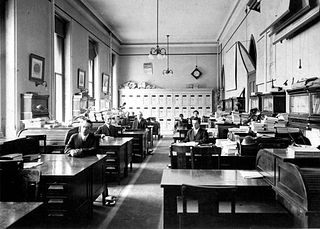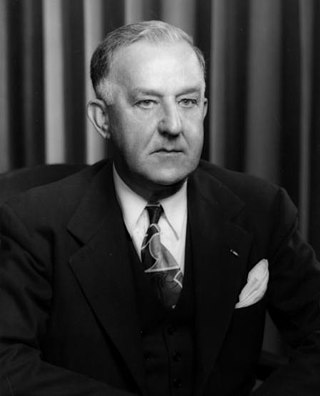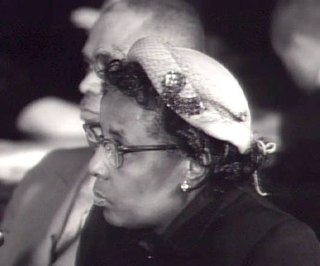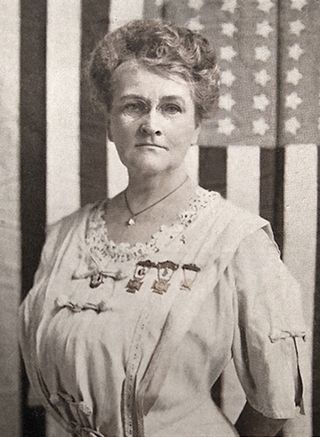Related Research Articles

The press gallery is the part of a parliament, or other legislative body, where political journalists are allowed to sit or gather to observe and then report speeches and events. This is generally one of the galleries overlooking the floor of the house and can also include separate offices in the legislative or parliamentary buildings accorded to the various media outlets, such as occurs with the Strangers Gallery in the British House of Commons or the Canberra Press Gallery in the Australian Parliament.

The National Press Club is a professional organization and social community in Washington, D.C. for journalists and communications professionals. It hosts public and private gatherings with invited speakers from public life. The club also offers event space to outside groups to host business meetings, news conferences, industry gatherings and social events.

Stephen Tyree Early was a U.S. journalist and government official. He served as the third White House press secretary under Franklin D. Roosevelt from 1933 to 1945 and as the acting press secretary under President Harry S. Truman in 1950 after the sudden death of Charles Griffith Ross. Early served as press secretary longer than any other person.
The News Chronicle was a British daily newspaper. Formed by the merger of The Daily News and the Daily Chronicle in 1930, it ceased publication on 17 October 1960, being absorbed into the Daily Mail. Its offices were at 12/22, Bouverie Street, off Fleet Street, London, EC4Y 8DP, England.

The United States Senate is the upper chamber of the United States Congress, which along with the United States House of Representatives—the lower chamber—comprises the legislative branch of the federal government of the United States. Like its counterpart, the Senate was established by the United States Constitution and convened for its first meeting on March 4, 1789 at Federal Hall in New York City. The history of the institution begins prior to that date, at the 1787 Constitutional Convention, in James Madison's Virginia Plan, which proposed a bicameral national legislature, and in the controversial Connecticut Compromise, a 5-4 vote that gave small-population states disproportionate power in the Senate.

The Cosmos Club is a 501(c)(7) private social club in Washington, D.C. that was founded by John Wesley Powell in 1878 as a gentlemen's club for those interested in science. Among its stated goals is, "The advancement of its members in science, literature, and art and also their mutual improvement by social intercourse."

Annie Lee Moss was a communications clerk in the US Army Signal Corps in the Pentagon and alleged member of the American Communist Party. She was believed to be a security risk by the FBI and her superiors at the Signal Corps, and was questioned by United States Senator Joseph McCarthy in his role as the chairman of the Senate Permanent Subcommittee on Investigations. The highly publicized case was damaging to McCarthy's popularity and influence.
The Gridiron Club is the oldest and among the most prestigious journalistic organizations in Washington, D.C.

Thomas Carey Hennings Jr. was an American political figure from Missouri. He was a Democratic member of the United States House of Representatives and the United States Senate.

Donald A. Ritchie is Historian Emeritus of the United States Senate.

Albert Merriman Smith was an American wire service reporter, notably serving as White House correspondent for United Press International and its predecessor, United Press. He won the Pulitzer Prize in 1964 for his coverage of the assassination of John F. Kennedy and was awarded the Presidential Medal of Freedom in 1969 by Lyndon B. Johnson.

Alice Allison Dunnigan was an American journalist, civil rights activist and author. Dunnigan was the first African-American female correspondent to receive White House credentials, and the first black female member of the Senate and House of Representatives press galleries. She wrote an autobiography entitled Alice A. Dunnigan: A Black Woman's Experience. She is commemorated by an official Kentucky Historical Society marker.
The Periodical Press Galleries (PPG), along with the Daily Press Galleries, Radio and Television Galleries, and Senate Press Photographers’ Gallery, comprise the four media galleries of the United States Congress. The United States Congress is the only legislature to divide its media into distinct press galleries. Collectively known as the Periodical Press Galleries, the PPG maintain two separate offices in the House and Senate wings of the Capitol in order to “assist Members of Congress, Congressional staff, and bona fide correspondents covering Congress, with media logistics and press-related concerns.”
Harry S. McAlpin (1906-1985) was an American reporter. He was the first African-American reporter to attend a U.S. Presidential news conference in 1944.
Laurence Todd (1882–1957) was an American journalist who worked as a news agency correspondent in Washington, DC. A committed radical, Todd worked as personal secretary to Socialist Congressman Meyer London from 1915 to 1916. Todd is best remembered as a correspondent for the Soviet news agency TASS for nearly three decades, a relationship about which he was interrogated in a hearing of the United States Senate in April 1956.
The Cleveland Convention Center labor dispute of 1963 was a dispute between the United Freedom Movement (UFM) and four local unions belonging to the AFL–CIO over the unions' institutional racism against African Americans. The dispute occurred during the construction of the Cleveland Convention Center in downtown Cleveland, Ohio. The dispute erupted on June 25, 1963, when the UFM threatened to begin picketing the convention center construction site. After a series of preliminary stop-gap agreements, a final agreement was reached on July 20 in which the unions agreed to admit blacks as members. This agreement collapsed within four days, and a new, more extensive agreement was reached on August 4 after intervention by the United States Department of Labor. Difficulties ensued implementing this agreement, but the threat of picketing ended on September 15. The August 4 agreement was hailed by civil rights groups and the government as a breakthrough in race relations in the American labor movement.

Sarah Isabel Worrell Ball McElroy was an American journalist and newspaper editor. She worked first in the western United States and later in Washington, D.C., where she became one of the first women admitted to the press gallery of the U.S. Senate. She was active in the Woman's Relief Corps and became the editor of the National Tribune, a weekly publication of the Grand Army of the Republic.
The Chicago Conservator was an American newspaper. Founded by attorney Ferdinand Barnett in 1878, it was the first African-American newspaper in Chicago.
The U.S. Senate Daily Press Gallery, along with the House Daily Press Gallery, the House and Senate Periodical Press Galleries, the House and Senate radio and Television Galleries, and the Senate Photographers’ Gallery, are the four media galleries of the United States Congress. The Senate Daily Press Gallery is located in the Senate wing of the United States Capitol. The gallery staff assist correspondents generally and maintain their access to Senate proceedings. The gallery includes the press seats that overlook the Senate floor and the surrounding offices where reporters work. Gallery staff track floor action, tally votes, and coordinate coverage of Senate news conferences and hearings.
Cora Rigby was an American journalist who was the first woman at a major newspaper to head a Washington News bureau and was one of the founders of the Women's National Press Club.
References
- ↑ Kelly, John (2017-07-05). "Perspective, Remembering when politicians didn't seem to hate journalists quite so much". Washington Post. ISSN 0190-8286 . Retrieved 2017-10-17.
- ↑ Ritchie, Donald A. (2005). Reporting from Washington: The History of the Washington Press Corps. USA: Oxford University Press. ISBN 9780199839094.
When the National Press Club admitted Louis Lautier as its first African American member in 1955, the women hoped their turn would soon follow.
- ↑ "The World Today". The Pittsburgh Courier. May 19, 1962. Retrieved 2017-10-16.
- ↑ "Archives Center | Portraits of a City: The Scurlock Photographic Studio, Lautier, Louis R., d. 1962". Smithsonian National Museum of American History (NMAH). 2005-04-12. Retrieved 2017-10-17.
- ↑ The African American national biography. Henry Louis, Jr. Gates, Evelyn Brooks Higginbotham. New York: Oxford University Press. 2008. ISBN 978-0-19-516019-2. OCLC 156816848.
{{cite book}}: CS1 maint: others (link) - ↑ Donald A. Ritchie, Reporting from Washington: The History of the Washington Press Corps (Oxford University Press, 2005), pp. 36-37.
- ↑ Gil Klein, Reliable Sources: 100 Years at the National Press Club (Turner Publishing, 2008), pp. 62-65.
- ↑ "The Press: Color Bar". Time Magazine. January 31, 1955. Archived from the original on July 25, 2008. Retrieved December 15, 2021.
Negroes are admitted to the club's big banquet hall when it is rented out to other organizations, but only two have ever ventured into the members' private dining room or Press Club bar. One, William Hastie, now a federal judge, was refused service; the other, C.I.O. Aide George Weaver, was served luncheon, but his newsman host got an anonymous letter warning him never to bring a Negro again.
- ↑ Ritchie, Donald A. (2005). Reporting from Washington: The History of the Washington Press Corps . New York, NY: Oxford University Press. pp. 45. ISBN 0195346327.